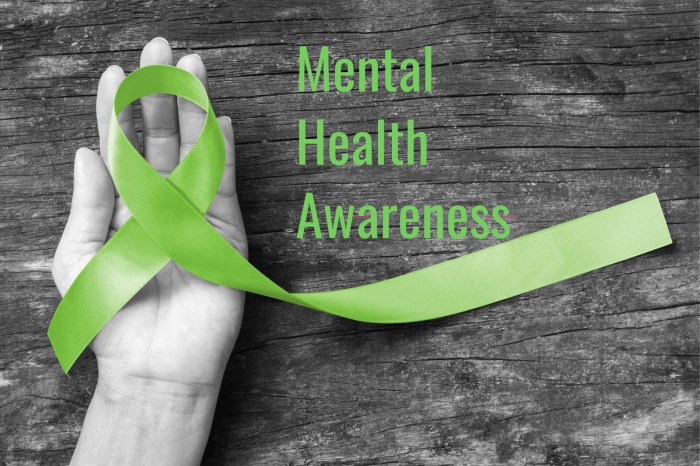Mental Health Awareness takes center stage, inviting readers into a world of knowledge and insight. Let’s dive into the importance of understanding mental health and how it impacts individuals and communities.
From combating stigma to exploring successful campaigns, this topic is crucial for promoting open conversations and early detection of mental health issues. Get ready to learn how self-care plays a vital role in maintaining overall well-being.
Understanding Mental Health Awareness
Mental health awareness refers to the understanding, recognition, and acceptance of mental health issues such as depression, anxiety, and other disorders. It involves educating individuals about the importance of mental well-being and promoting open conversations about mental health.
Importance of Raising Awareness
- Reducing stigma: By raising awareness, we can help break down the stigma surrounding mental health issues, encouraging individuals to seek help without fear of judgment.
- Early intervention: Increased awareness can lead to early detection and intervention for mental health problems, preventing them from escalating into more severe conditions.
- Promoting self-care: Awareness campaigns can empower individuals to prioritize their mental health, practice self-care, and seek help when needed.
- Community support: When communities are educated about mental health, they can offer support and resources to those struggling, creating a more compassionate and understanding environment.
Impact of Mental Health Awareness
- Improved access to resources: Awareness campaigns can help individuals access mental health services, support groups, and hotlines, providing them with the help they need.
- Reduced suicide rates: By promoting mental health awareness and suicide prevention, communities can work together to reduce the number of suicides and provide support to those in crisis.
- Enhanced well-being: When individuals are aware of mental health issues, they can take steps to improve their overall well-being, leading to a healthier and happier life.
- Policy changes: Increased awareness can lead to changes in policies and laws related to mental health, ensuring better support and care for those in need.
Stigma Surrounding Mental Health: Mental Health Awareness
The stigma surrounding mental health is a significant barrier that prevents many individuals from seeking the help they need. It often leads to discrimination, prejudice, and negative stereotypes against those struggling with mental health issues.
Effects of Stigma
- Individuals may feel ashamed or embarrassed to talk about their mental health concerns, leading to isolation and worsening symptoms.
- Stigma can result in individuals being labeled as “crazy” or “weak,” which can further discourage them from seeking treatment.
- Some people may internalize the stigma and believe they are unworthy of help or support, causing them to suffer in silence.
Combatting Stigma, Mental Health Awareness
- Educating the public about mental health and challenging misconceptions can help reduce stigma and promote understanding.
- Encouraging open conversations about mental health in schools, workplaces, and communities can create a supportive environment for those in need.
- Sharing personal stories of recovery and resilience can humanize the experience of mental illness and show that seeking help is a sign of strength, not weakness.
Mental Health Awareness Campaigns

When it comes to raising awareness about mental health, various campaigns have been successful in reaching a wider audience and breaking the stigma surrounding mental health issues.
Successful Campaigns
- The “Bell Let’s Talk” campaign in Canada has been highly effective in encouraging open conversations about mental health. Through social media, they promote the use of a specific hashtag to raise funds for mental health initiatives.
- The “It’s Okay To Not Be Okay” campaign by the National Alliance on Mental Illness (NAMI) in the United States uses powerful storytelling and personal testimonials to connect with individuals struggling with mental health challenges.
- The “Heads Together” campaign in the UK, spearheaded by members of the royal family, focuses on ending the stigma surrounding mental health and providing resources for support.
Strategies Used
- Personal Stories: Many successful campaigns incorporate personal stories to create a connection with the audience and highlight the importance of seeking help.
- Celebrity Endorsements: Involving well-known figures in the campaigns helps to reach a wider audience and reduce the stigma associated with mental health.
Effectiveness of Social Media
Social media has been a powerful tool in promoting mental health awareness due to its wide reach and accessibility. Campaigns can use platforms like Instagram, Twitter, and Facebook to share resources, personal stories, and information about mental health support services. The interactive nature of social media allows for real-time engagement with the audience, fostering a sense of community and support.
Impact of Mental Health Awareness
Increased awareness of mental health can have a significant impact on individuals and communities. By shedding light on mental health issues, awareness campaigns can lead to early detection of these problems, allowing individuals to seek help and support sooner.
Role of Education in Improving Mental Health Literacy
Education plays a crucial role in improving mental health literacy. By incorporating mental health education into school curriculums and workplace training programs, individuals can gain a better understanding of mental health issues, symptoms, and available resources. This knowledge empowers individuals to recognize signs of mental health problems in themselves and others, reducing stigma and promoting early intervention.
Positive Outcomes of Mental Health Awareness Initiatives
One example of the positive outcomes of mental health awareness initiatives is the destigmatization of seeking help for mental health issues. When awareness campaigns normalize conversations about mental health, individuals feel more comfortable reaching out for support and treatment. This can lead to improved mental health outcomes, reduced rates of suicide, and stronger support networks within communities.
Self-care and Mental Health Awareness

Self-care practices play a crucial role in promoting mental health awareness and overall well-being. By prioritizing self-care, individuals can better manage their mental health and reduce the risk of developing mental health issues.
The Relationship between Self-care Practices and Mental Health Awareness
Self-care involves taking intentional actions to care for your physical, emotional, and mental well-being. When individuals practice self-care regularly, they become more attuned to their mental health needs and can identify early signs of distress or imbalance. This awareness is essential in recognizing when professional help may be necessary.
Tips for Prioritizing Mental Health through Self-care
- Make time for activities that bring you joy and relaxation, such as hobbies or spending time with loved ones.
- Practice mindfulness and meditation to help manage stress and improve mental clarity.
- Establish healthy boundaries in your relationships and learn to say no when needed.
- Prioritize regular exercise and a balanced diet to support your physical and mental health.
- Get enough rest and prioritize quality sleep to recharge your mind and body.
The Importance of Self-care in Maintaining Overall Well-being
Self-care is not a luxury but a necessity for maintaining overall well-being. When individuals prioritize self-care, they are better equipped to handle life’s challenges, reduce stress, and improve their mental health. By taking care of themselves, individuals can lead happier, more fulfilling lives and contribute positively to their communities.

